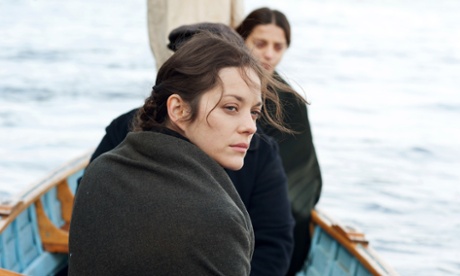
It’s a mystery why James Gray’s The Immigrant isn’t a great movie. It looks like one, and sounds like one, summoning a vision of New York in the 1920s that rivals Coppola’s in The Godfather, with the sooty tenements of the Lower East Side seeming to glow under the touch of cinematographer Darius Khondji. The whole film has a spectral beauty – like a sun-faded photograph, or some long-forgotten classic from the 1970s, back when moviemakers like Coppola and Sergio Leone took on the immigrant experience as the American subject in films. That’s how The Immigrant feels: like a slightly faded classic that you can’t remember whether you've seen or not.
Marion Cotillard plays Ewa, a Polish immigrant coming through Ellis Island when her sickly sister is quarantined by the authorities. She is sprung from deportation by a well-dressed gentleman in a bowler hat (Joaquin Phoenix), who gives her board and lodging, as he does to other women. It’s all vaguely creepy in a way you can't put your finger on. Cotillard is wide-eyed with mistrust, Phoenix fastidious and kindly, but overly so by just a few degrees, so when his fury arrives it comes almost as confirmation of your worst fears. The women, it transpires, perform nightly for him in a burlesque house that also serves as a speakeasy and brothel. Ewa, bit by bit, is pushed into prostitution in order to secure her sister’s release.
The role was written by Gray specifically for Cotillard, and it’s an actor's dream, which isn't to say all dreams should be granted. A vessel of pure, noble suffering in the mould of Hardy’s Tess, or Flaubert’s Emma Bovary, Ewa is one of those fallen women whose internal purity is only accentuated by being dragged through the mud. Cotillard goes digging in the same place she found her Edith Piaf and comes up with another tremulous waif, her big eyes wide with hunger for a new life, delivering her lines in a breathy, Silesian whisper as if barely aware she's even speaking. Indeed, slap a little panstick on her and she could pass muster as a silent-era heroine. Gray is one of the unsung directorial talents, unafraid of melodrama or big emotions. This could almost be a prequel to his previous films, all sombre, morally knotted tragedies — We Own the Night, Little Odessa, Two Lovers, The Yards — in which protagonists return to, and are ensnared in, their own backyards.
But The Immigrant is missing his usual urgency, that doomy, thrilling undertow that sucks people to their fate. The whole thing feels underpowered. It’s at its strongest the closer it draws to music: a performance at Ellis island by the opera singer Enrico Caruso, for example, where Ewa first meets Bruno’s cousin, Orlando (Jeremy Renner), a handsome magician who talks of whisking her away to California. You can see Renner panicking a little over how to play this dreamboat, and deciding in the end to let the Errol Flynn moustache decide the matter. But Renner’s a firestarter by nature, with a wonderful crackle of unpredictability. I wonder what would have happened if Gray had swapped his two male leads?
Phoenix might have brought a few dents to this knight in shining armor, while Renner would have brought a much-needed sense of danger to Bruno. It’s been conceived in part as a beauty-and-the-beast romance, but Phoenix’s love for Ewa, slow to register, ends up doubling him over like an impacted molar. He’s a self-harmer, not a brute, and his mournful, misshapen presence seems to subdue the movie further. Gray has made four movies with Phoenix now and I wonder if the two men haven't grown a little invisible to one another (the same thing happened with Scorsese and De Niro).
The Immigrant is almost worth seeing for its final shot: an image of forked paths and bifurcated destinies with a sense of fatalism that seems positively Dostoevskian. No other American filmmaker is interested, or capable, of striking that note right now. We should be watching Gray the same way he watches us: like a hawk.

